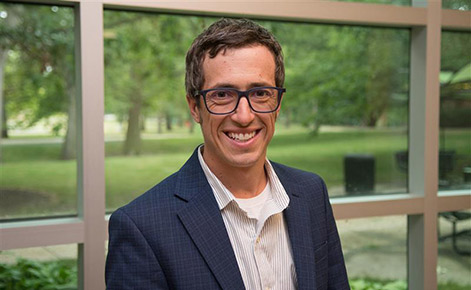Research from Michigan State University could make daily decisions for professionals who work with children with autism faster and more effective.
“We have created a guide for practitioners on how to make quicker, stronger and more data-informed decisions in practice,” said Matt Brodhead, assistant professor of Applied Behavior Analysis and co-author of the study. “It could make treatment more efficient while simultaneously improving quality and care.”

The study, published in the Journal of Behavioral Education, is the one of the first of its kind in the field to empirically evaluate how a clinical decision-making model could help individuals better understand how, or if, interventions are working for those with autism. Interventions include things such as teaching a child how to communicate with adults, or how to appropriately play with their peers.
“This research has a particular benefit for front-line technicians, such as teachers, staff and paraprofessionals, who work with students and implement interventions on a daily basis—but are often not trained on how to interpret data from those interventions,” said lead author Kailie Kipfmiller. The study was her thesis; she graduated in the first cohort of the M.A. in Applied Behavior Analysis.
The study provided participants, all front-line technicians, with a flow chart to help them determine if interventions should be continued or discontinued, modified, or considered complete. By examining charts on interventions with students, and then answering the accompanying flow chart questions such as “are data trending upward or downward?”, the MSU scholars theorized technicians in schools, day cares and other learning centers could be led to making better choices.
In fact, all participants, most of whom had no prior experience with behavior analysis, improved in their decision-making.
The need for this is critical, Kipfmiller says.
“Board Certified Behavior Analysts® (BCBA®) might not be able to see students they are working with every day, and we don’t want their progress to be put on hold for days at a time. Training front-line employees to make these decisions can help keep things moving.”
Not only was the model able to help employees make better decisions, but they were able to do so faster with the training provided in the study.
On average, the researchers say training for such employees is often in-person and can take a long time to complete—sometimes more than 100 minutes. The model and online training designed by Kipfmiller, Brodhead and other MSU scholars took, on average, less than eight minutes.
“The online model is accessible and opens up training opportunities to a larger group of individuals compared to a time-intensive one-on-one model many organizations currently use,” said Kipfmiller.
Brodhead is continuing the line of research to explore how it could be expanded and developed for use across learning environments, and with others, such as practicing BCBAs® who oversee behavioral services of children with autism, and supervise front-line employees.
“Anyone in a supervisory position looking to standardize how decisions are made in their organization and how practices could be implemented could benefit from this research.”
Next steps
In addition, Brodhead plans to examine how long people need the decision-making model before they can effectively and accurately make decisions 100% of the time.
Kipfmiller, now a BCBA® in Bay City, Mich., is using what she learned from this study and the MA-ABA program in her daily work.
“I cannot praise MSU and the MA-ABA program enough,” she said. “I am so grateful for everything I learned in the program and the training I received. Because of what I learned at MSU, I feel so confident as a clinician and a supervising BCBA®.”
Read more
The first cohort, including Kipfmiller, who graduated in 2018, is already making its impact in the field. Read how.
The Early Learning Institute is an interdisciplinary collaboration with the College of Social Science and the College of Education, and includes Brodhead as its research director. Learn more.






